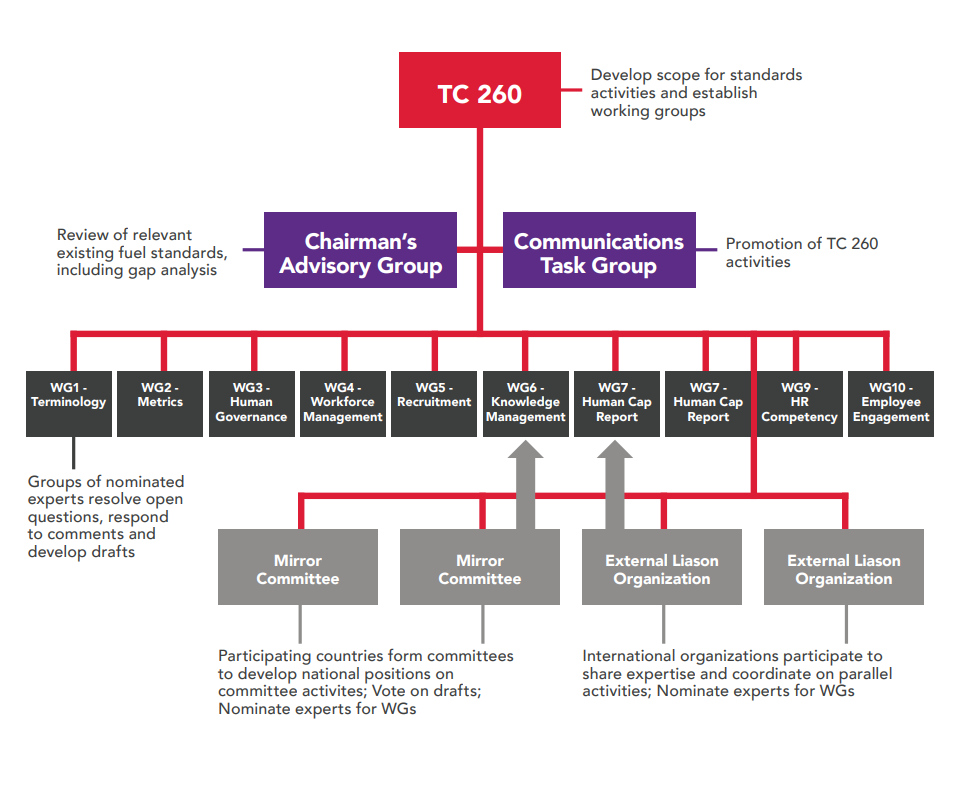The American National Standards Institute (ANSI) has appointed HRCI as the International Secretariat for the International Organization for Standardization (ISO) Technical Committee (TC) 260 on Human Resource Management. The leadership of Global Standards under the ISO umbrella allows HRCI to continue to serve its HR professionals and organizations as they continue toward excellence in HR Management.
Play Video
What Is ISO TC 260?
Since its inception in 2011, global experts from 38 countries have actively engaged in the development of global HR standards that can be adopted by organizations, regardless of country, company size, or complexity.
ISO TC 260 is responsible for the development of a series of standards for human resource management processes and practices. There are 32 standards and technical specifications published, with 7 more under development. One of the most noteworthy standards from this work is ISO 30414 Human Capital Reporting which many chief financial officers believe is a safe harbor for the recent ruling from the SEC requiring Human Capital Management Disclosures.

Dr. Sandy Miles, SPHR, GPHR, former HRCI board member, and HRCI CEO Amy Dufrane, Ed.D, SPHR, CAE, have worked together closely, leading the charge by representing HRCI. Former HRCI board chair, Mr. Jim Lewis, SPHR, GPHR, is the current ISO TC 260 Board Chair. The leadership of Global Standards under the ISO umbrella allows HRCI to continue to serve its HR professionals and organizations as they continue toward excellence in HR Management. Since 2011, global experts from 38 countries have actively engaged in the development of global HR standards that can be adopted by organizations, regardless of country or company size and complexity.
Providing a framework for diversity & inclusion, global standard ISO 30415:2021 presents fundamental prerequisites, associated accountabilities and responsibilities, recommended actions, suggested measures and potential outcomes. The standard incorporates seven values, including equity and equality. It recognizes that each organization is different and that decisionmakers need to determine the most appropriate approach to embedding D&I in their organization, based on the organization’s context and disruptive challenges that may emerge.
HR professionals have a unique opportunity to shape the landscape of global HR standards by joining the U.S. Technical Advisory Group (TAG) for ISO HR standards. Open to all U.S. nationals who are directly and materially impacted by HR standards activities, U.S. TAG seeks individuals and organizations interested in the coordination and development of these standards. This is a call to action for HR professionals to get involved and make a significant impact in the field.
Get Involved with U.S. TAG Watch Video to Learn More About U.S. TagHRCI is now the International Secretariat for the International Organization for Standardization (ISO) Technical Committee (TC) 260 on Human Resource Management. The leadership of Global Standards under the ISO umbrella allows HRCI to continue to serve its HR professionals and organizations as they continue toward excellence in HR Management.
HRCI is responsible for providing leadership, technical, and administrative services to ISO TC 260, acting in a purely international capacity, divesting itself of a national point of view. More specifically, the secretariat is responsible for the following:
A collection of best practices, guidelines, customs, experiences, and practical solutions that are collaboratively and voluntarily developed through consensus and are regularly revisited and revised.
TC, or Technical Committee, 260 for Human Resource Management is a composed of representatives from various national standards bodies, such as the American National Standards Institute (ANSI), which create a strategic business plan to address areas where HRM standards could be beneficial.
Human Resource Management (HRM) can significantly create business value by evolving from a cost center to a strategic partner in organizational growth. By attracting and retaining top talent, HRM ensures the organization possesses the skills needed for success. Investing in employee training and engagement not only boosts productivity but also diminishes turnover, directly impacting the bottom line. Additionally, by aligning individual goals with company objectives, HRM enhances efficiency and contributes to achieving strategic targets. A major role of HRM is also fostering a positive and inclusive culture, which elevates employee satisfaction and overall organizational effectiveness. Moreover, ensuring compliance with labor laws and effectively managing risks safeguards the organization from potential legal and financial issues. Through these strategic initiatives, HRM supports operational requirements while driving business performance and growth.
Standards play a crucial role in enhancing the efficiency and consistency of Human Resource Management (HRM) practices. Without consistent standards, it becomes challenging to accurately compare and evaluate HR metrics and outcomes across different departments or organizations.
The American National Standards Institute (ANSI) is a private, non-profit organization that administers and coordinates the U.S. voluntary standards and conformity assessment system. Founded in 1918, the Institute works in close collaboration with stakeholders from industry and government to identify and develop standards- and conformance-based solutions to national and global priorities. ANSI serves as a strong voice on behalf of the U.S. voluntary standards community, protecting and strengthening its impact domestically and internationally. Through its membership, partnerships, and diverse programs and activities, ANSI represents the interests of more than 270,000 companies and organizations and 30 million professionals worldwide. www.ansi.org.
Founded in 1947, the Organization for International Standards (ISO) is an independent, non-governmental organization comprised of 165 countries who come together through National standards bodies to develop proprietary, industry, and commercial global standards. Through its members, it brings together experts to share knowledge and develop voluntary, consensus-based, market-relevant international standards that support innovation and provide solutions to global challenges. The Central Secretariat is located in Geneva, Switzerland. www.iso.org